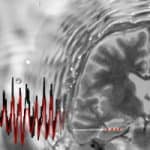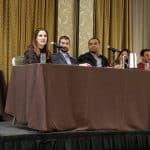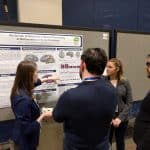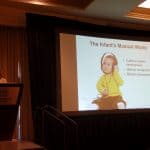Matthew Costello has been studying how aging affects cognition and perception for close to 10 years. But answers to the questions of exactly how and why visual working memory declines in older adults have still eluded him and other researchers. Now, he is taking an information processing approach to this […]
Nanthia Suthana is working to become fluent in the “language of the brain.” She does not study linguistics but rather that electrical patterns that the brain uses to communicate. She and her team at UCLA seek to alter these patterns by externally stimulating brain cells with electricity – testing its […]
CNS 2018 In the neurosciences, there exists a veritable orgy of data – but is that what we need? Will the colossal datasets we now enjoy solve the questions we seek to answer, or do we need more ‘big theory’ to provide the necessary intellectual infrastructure? Four leading researchers, with […]
CNS 2018 To kick off the 25th anniversary meeting of the Cognitive Neuroscience Society, Michael Gazzaniga (University of California, Santa Barbara) took us back to the beginning of the field, and then on a whirlwind tour through the history of thought on consciousness. How do neurons turn into minds? How […]
CNS 2018 Guest Post by CNSTA Committee Coping with public speaking jitters, learning how to say no, and navigating the non-academic life – these were just some of the topics tackled in the 3rd annual CNSTA Professional Development Panel held last week at CNS 2018 in Boston. Practice talking about your work, […]
CNS 2018 – Graduate Student Award Poster It’s a persistent societal stereotype that boys are naturally better at math than girls. Behavioral work has suggested no such gender difference in math abilities in children, and now, for the first time, researchers have used statistical analysis of fMRI scans of young […]
It was a great 4 days of science in Boston at CNS 2018! The sun was out and it was warming up outside, while inside participants were treated to the last poster session of the meeting and a wonderful set of final symposia. Talks covered what makes musical rhythm special […]
The highlights of the third day of CNS 2018 in Boston were the wonderful award talks in the afternoon. Receiving her Young Investigator Award, Morgan Barense of the University of Toronto discussed how perception and memory. And co-recipient of the award Michael Yassa of the University of California, Irvine, took […]
CNS 2018 Press Release March 26, 2018 – Boston – The time babies spend in the womb is far from idle. The brain is changing more rapidly during this time than at any other time in development. It is an active time for the fetus to grow and explore, and […]











